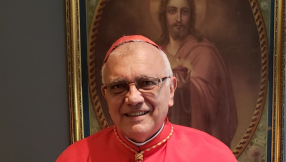Titanic tragedy remembered 100 years on
More than 1,500 people perished when the Titanic struck an iceberg in the North Atlantic at 11:40pm on 14 April 1912 and sank less than three hours later, in the early hours of 15 April.
Wreathes were thrown into the water at the exact spot where the Titanic sank by people, including relatives of victims, on board the memorial cruise on the MS Balmoral. A two minutes' silence was observed at the moment the ship sank before the Balmoral left the site and continued on its journey to Halifax, Nova Scotia, where many of the bodies were taken.
In Belfast, where the White Star Line ship was built, a vigil was held at 11:40pm on Saturday night, led by the Rev Chris Bennett, of The Dock Church in the historic Titanic Quarters. During, the vigil, the names of those lost and the last desperate SOS messages sent by the ship's telegraphists were read aloud. A Requiem was also held at St Anne's Cathedral.
Today, a special Titanic commemoration service is taking place in the city’s St Peter’s Cathedral followed by the unveiling of a new memorial garden and a memorial procession from St Peter’s to Belfast City Hall.
The service began with the singing of the hymn "Eternal Father, Strong to Save", which was sung during the last service on board the Titanic.
It closed with a minute's silence and the hymn "Nearer My God to Thee", said to be played by the Titanic's band as the ship sank into the sea.
In Southampton, where the Titanic sailed from and one of the towns to be worst hit by the tragedy, the annual commemorative service will have added poignancy on the centenary. It is being led this year by Rev Dr Julian Davies and will include music from the Salvation Army Band and the City of Southampton. The Mayor of Southampton Councillor Terry Matthews was to be in attendance.
Tonight, a memorial service is being held in Liverpool Cathedral, led by the Bishop of Liverpool, the Rt Rev James Jones.
The bishop said: “The Titanic was a national disaster that deeply affected the lives of many on Merseyside. The Maritime Museum exhibition and this cathedral service give us the moment to remember those both lost and saved and to cherish Liverpool’s maritime history which the city is taking forward with great pride into the 21st century.”
A Titanic memorial is also being re-opened to the public in Godalming, near Guildford. Jack Philips, telegraphist aboard the Titanic, grew up in the neighbouring village of Farncombe where he sang in the local church choir, and later learned telegraphy in the post office in Godalming. He bravely sent out SOS messages as the ship sank and died in the tragedy.
The memorial recently underwent a major refurbishment in time for the anniversary.
The Rev Mervyn Roberts, parish priest at the Church of St Peter and St Paul in Godalming, will lead the service. The church opened its doors throughout Saturday night for members of the public who wished to pay their respects and light a candle in memory of the victims.
Rev Roberts said the occasion was “commemoration more than celebration”.
“It is for anyone who wants to come and reflect on the lives that were lost and just the amazing courage that is not always depicted in the Titanic films from the Hollywood angle,” he said.
Earlier on Sunday, members of the community gathered to say a prayer at the grave of Phillips’ parents, which also has a small memorial plaque to their son.
Phillips’ body was never returned to his parents and it is believed he was buried alongside other unidentified victims in Canada.
Rev Roberts said that the tragedy remained close to the heart of the people of Godalming. In the immediate aftermath of the sinking, villagers were quick to raise money for a memorial to remember Phillips and to contribute towards a fund for the people affected.
“The town took a real interest,” he said.
“It says a lot about Jack and his parents, and how the people in the town felt about them. They were respected and liked.”













